Key takeaways
- Education reforms should balance accountability with support to nurture rather than disrupt the learning environment.
- Michelle Rhee’s focus on results-driven accountability raises concerns about neglecting the creative and relational aspects of teaching.
- Flexibility in applying reforms is crucial, allowing teachers to adapt to their unique classroom needs for effective engagement.
- Meaningful reform requires patience and genuine investment in teachers, ensuring support aligns with high expectations to prevent burnout.
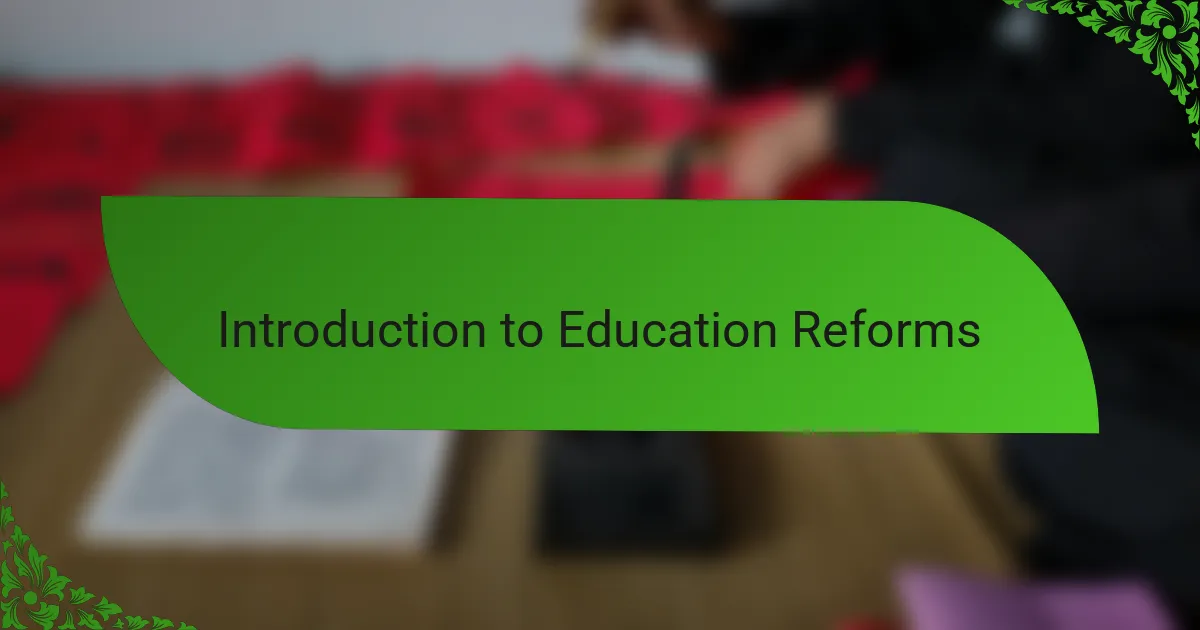
Introduction to Education Reforms
Education reforms often stem from a desire to improve systems that seem stagnant or unfair. I’ve seen firsthand how small changes can ripple through a classroom, affecting not just students but teachers and communities too. What drives people to push for reform, and at what cost?
When I first encountered education reform efforts, I wondered if they truly understood the complexities teachers face daily. Reforms promise progress, but can they balance accountability with support? It’s a delicate dance, and the stakes feel incredibly high.
Reflecting on my own experiences, I realize reforms aren’t just policy shifts—they touch emotions and identities. Change in education can feel threatening or hopeful depending on the approach. How do we ensure reforms nurture rather than disrupt the learning environment?
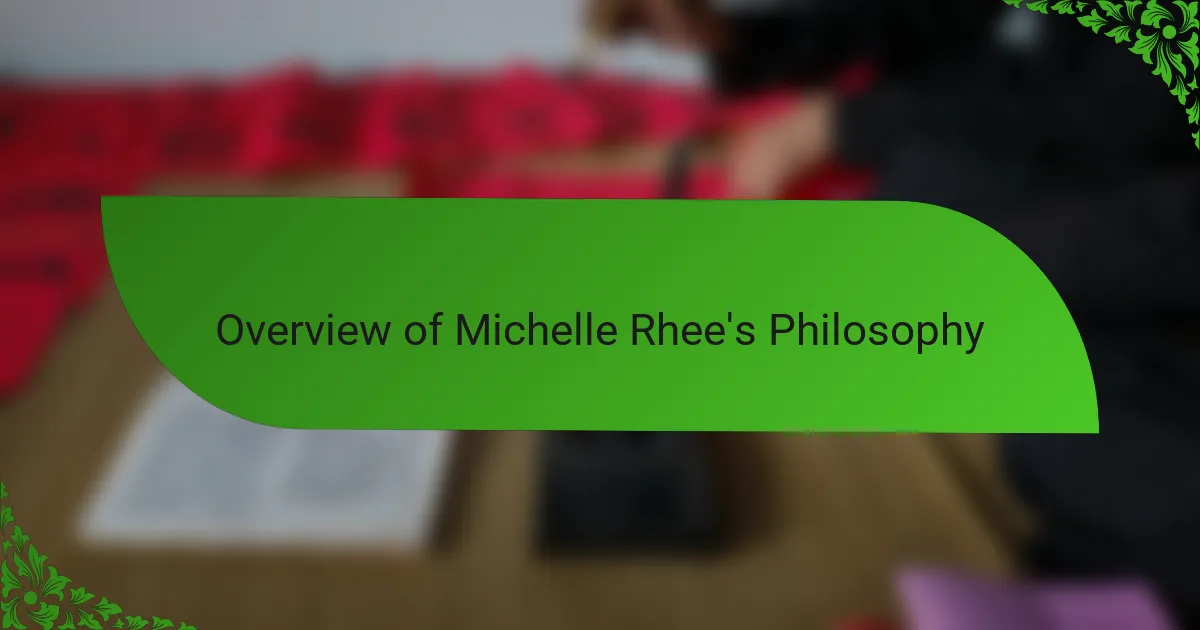
Overview of Michelle Rhee’s Philosophy
Michelle Rhee’s philosophy centers heavily on accountability and the belief that every student deserves excellent teaching. From what I’ve gathered, she views education reform as a means to shake up complacency and push schools toward measurable results. But I often wonder if this focus on metrics captures the full picture of what makes a school truly effective.
Her approach feels very results-driven, which I can see as both a strength and a limitation. On one hand, demanding high standards can motivate educators to improve. On the other hand, I worry whether this leaves enough room for the human side of teaching—the mentorship and creativity that don’t always show up on standardized tests.
When I consider Rhee’s philosophy, I can’t help but ask myself: does strict accountability spur genuine growth, or does it risk narrowing education to numbers and performance rankings? Reflecting on my own experiences in classrooms, I believe the answer lies somewhere in balancing these forces, not favoring one at the expense of the other.
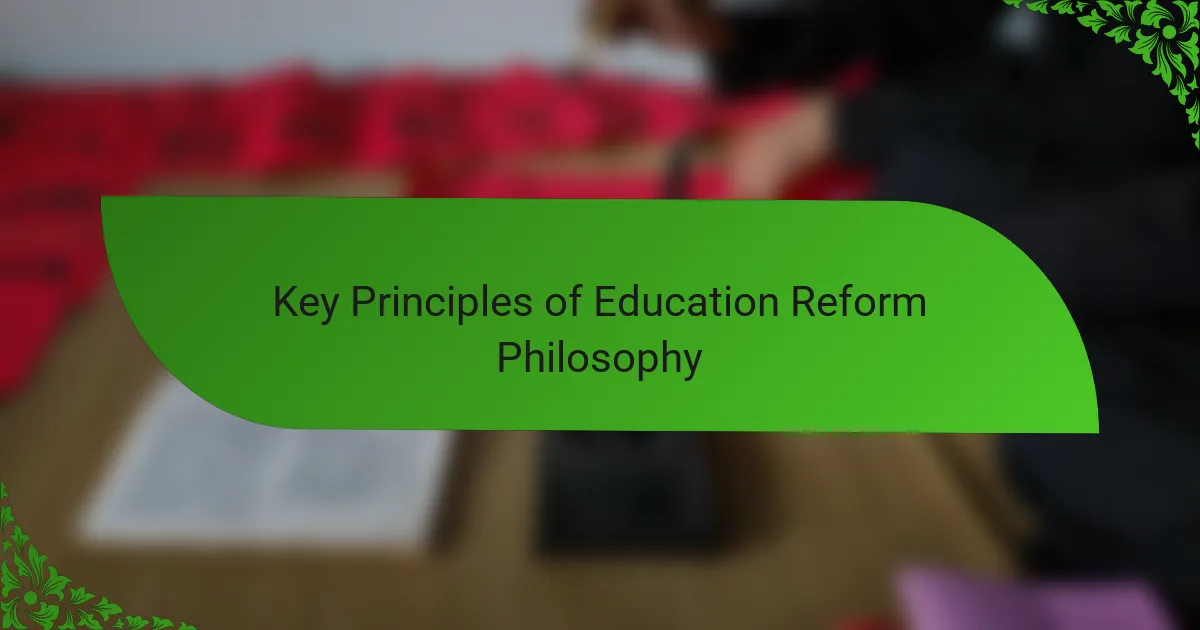
Key Principles of Education Reform Philosophy
One principle that stands out to me in education reform philosophy is the emphasis on accountability. I’ve seen good teachers frustrated by vague expectations, so having clear standards makes sense. But I also question, does strict accountability sometimes overshadow the nuances of teaching that can’t be so easily measured?
Another key idea revolves around equity—ensuring every student gets a fair shot at quality education. This principle speaks to me deeply because I remember students in my neighborhood whose potential was overlooked but could have soared with the right support. How do reforms balance pushing for excellence while also tailoring approaches to individual needs?
Lastly, I think flexibility is crucial, though it’s often underestimated in reform movements. In my experience, rigid policies can stifle innovation in the classroom. Isn’t it important that reforms allow teachers the freedom to adapt and respond to their unique challenges without feeling boxed in by mandates?
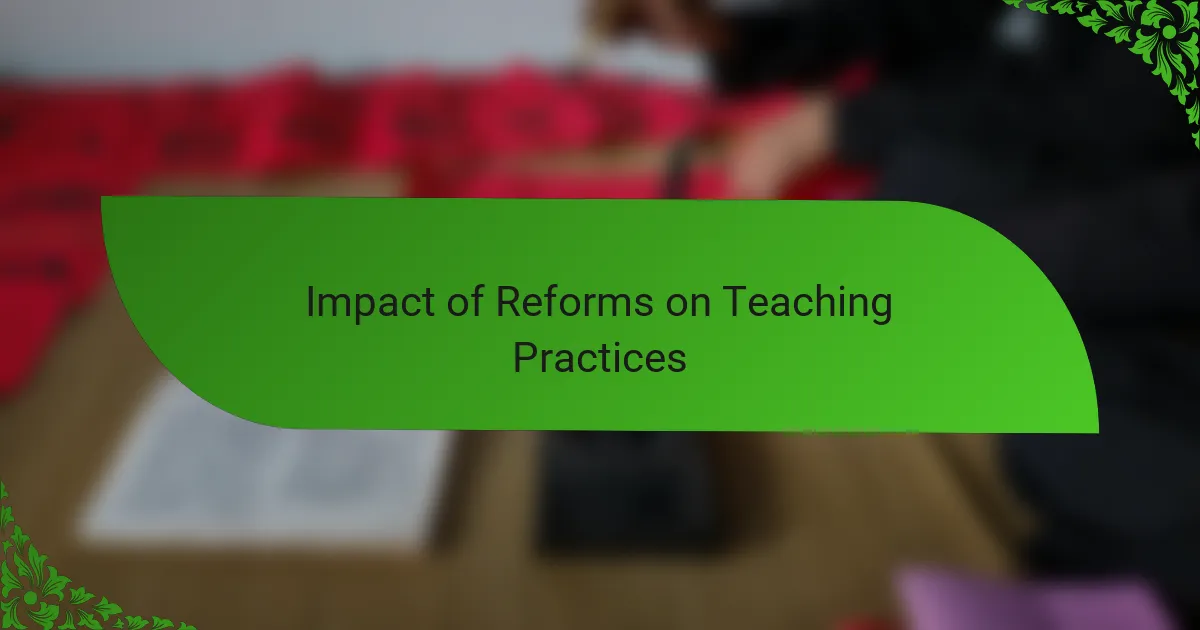
Impact of Reforms on Teaching Practices
Michelle Rhee’s reforms clearly changed how teachers approach their work, especially by increasing scrutiny through frequent evaluations. From what I’ve seen, this can push educators to be more deliberate and data-driven. But does this constant pressure enhance teaching, or does it risk turning classrooms into test factories where creativity gets squeezed out?
I remember a teacher friend telling me how these reforms made her rethink lesson plans to meet tighter metrics. She said it helped her focus, but also made her feel like she was losing the art of teaching. Is it possible that in chasing accountability, we might unintentionally diminish the relational and intuitive aspects that make teaching so impactful?
Still, some changes encourage ongoing reflection and professional growth, which I appreciate deeply. When teachers are supported to assess their methods and adjust, the reform ideals align with real progress. How often, though, do these reforms provide that genuine support versus just demanding results? This balance influences how teaching practices evolve in meaningful ways.
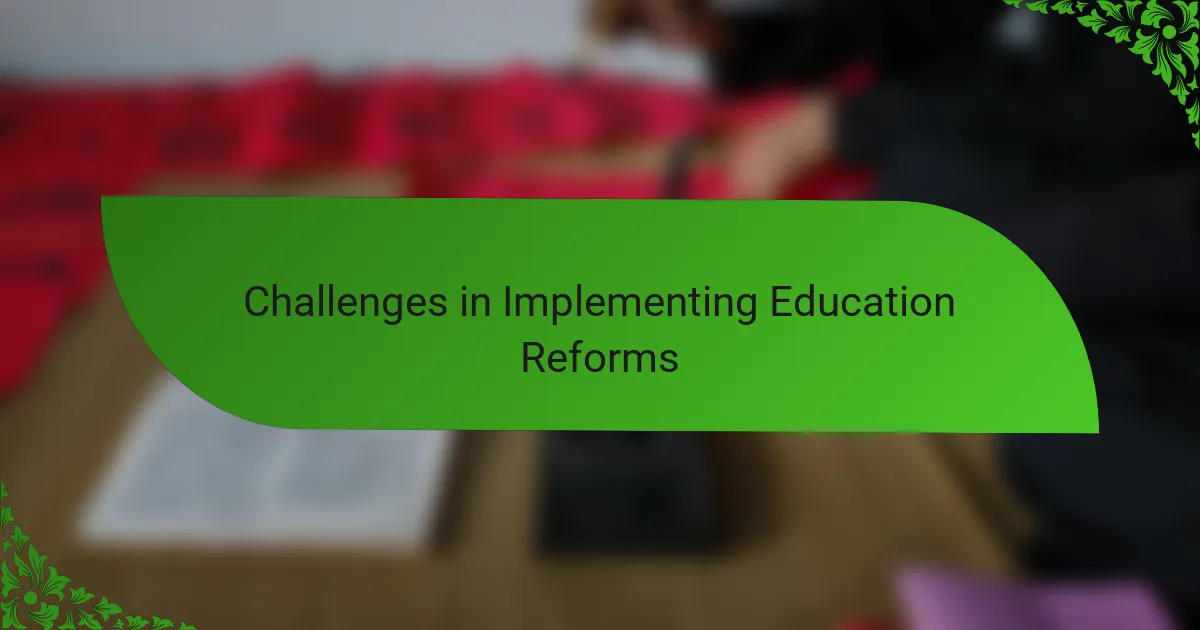
Challenges in Implementing Education Reforms
Implementing education reforms like those championed by Michelle Rhee often bumps up against resistance from teachers and communities who feel overwhelmed by rapid change. I’ve witnessed how well-intentioned policies can ignite fear—teachers worry about job security, autonomy, and the pressure to meet rigid standards. Isn’t it understandable that change, no matter how necessary, can feel like an uphill battle when it challenges deeply held routines?
Another challenge lies in balancing high expectations with realistic support. In my experience, pushing for accountability without providing resources or professional development can leave educators feeling isolated and demoralized. I’ve seen passionate teachers struggle not because they lack will, but because the system doesn’t always equip them to meet new demands effectively. How can reforms succeed if they don’t walk hand in hand with meaningful support?
Finally, measuring success in education is far more complex than test scores and evaluations suggest. From what I’ve gathered, reforms tend to emphasize quantifiable results, but I worry this narrow focus misses the broader, nuanced goals of education—like fostering critical thinking and creativity. Does an overemphasis on metrics risk reducing teaching to a numbers game, and what does that mean for the philosophy of education we all value?
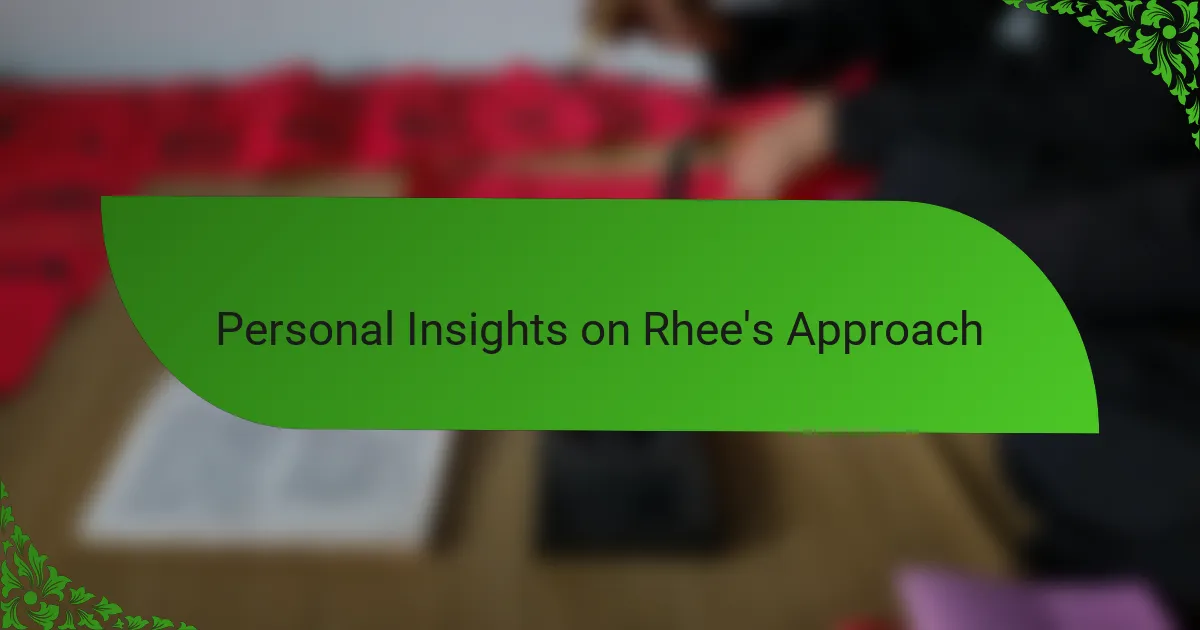
Personal Insights on Rhee’s Approach
I find Michelle Rhee’s approach both inspiring and troubling. On one hand, her insistence on accountability resonates with my belief that education should never settle for mediocrity. Yet, I’ve seen how this relentless focus can sometimes overlook the subtle, human aspects of teaching that defy easy measurement. Can true educational growth be captured in numbers alone?
Thinking back to conversations with educators caught in the reform crossfire, I notice a pattern: many feel energized to push harder but simultaneously drained by constant evaluation. It makes me wonder, does this approach empower teachers, or does it create an environment where fear of failure stifles innovation and passion? From my experience, sustainable reform requires more than mandates—it demands trust and collaboration.
What strikes me most about Rhee’s model is its urgency to fix what’s broken, which I respect deeply. But I ask myself, how do we balance swift action with patience for the complex, often slow work of cultivating meaningful learning? My gut says reforms work best when they honor teachers’ insights and preserve the spirit of education as a creative, evolving relationship.
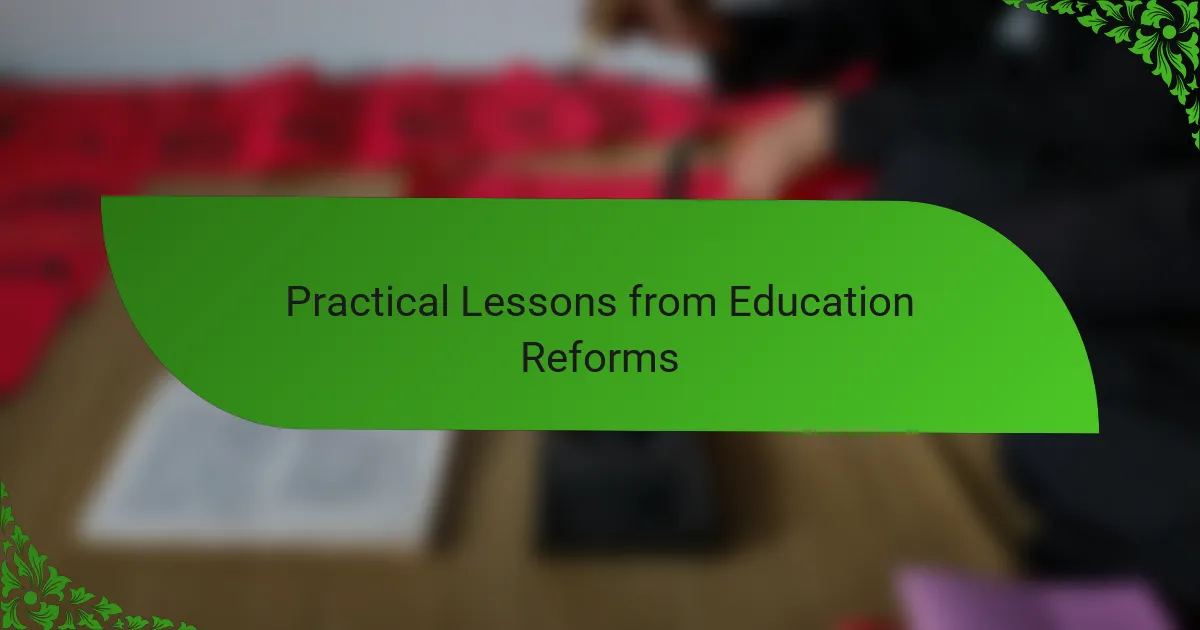
Practical Lessons from Education Reforms
One lesson I’ve taken from these reforms is the need for practical accountability that supports rather than punishes teachers. I remember a colleague who said the frequent evaluations prompted her to reflect more deeply on her methods—but she also worried about the pressure to constantly “prove” her worth. Doesn’t that highlight how crucial it is for reforms to offer encouragement alongside metrics?
I’ve also noticed that flexibility in applying reforms isn’t just a nice-to-have; it’s essential. When educators are allowed to tailor strategies to their unique classrooms, they tend to innovate and engage students better. Why impose blanket rules when the art of teaching thrives on adaptation and intuition?
Finally, the reforms taught me that change cannot be rushed without considering the emotional and professional toll on teachers. How many times have I seen talented educators burn out when support doesn’t keep pace with expectations? Real progress, from my experience, requires patience and genuine investment in those on the front lines of education.